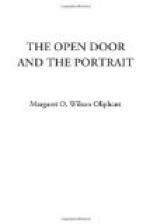The village of Brentwood lay almost under the house, on the other side of the deep little ravine, down which a stream—which ought to have been a lovely, wild, and frolicsome little river—flowed between its rocks and trees. The river, like so many in that district, had, however, in its earlier life been sacrificed to trade, and was grimy with paper-making. But this did not affect our pleasure in it so much as I have known it to affect other streams. Perhaps our water was more rapid; perhaps less clogged with dirt and refuse. Our side of the dell was charmingly accidente, and clothed with fine trees, through which various paths wound down to the river-side and to the village bridge which crossed the stream. The village lay in the hollow, and climbed, with very prosaic houses, the other side. Village architecture does not flourish in Scotland. The blue slates and the gray stone are sworn foes to the picturesque; and though I do not, for my own part, dislike the interior of an old-fashioned hewed and galleried church, with its little family settlements on all sides, the square box outside, with its bit of a spire like a handle to lift it by, is not an improvement to the landscape. Still a cluster of houses on differing elevations, with scraps of garden coming in between, a hedgerow with clothes laid out to dry, the opening of a street with its rural sociability, the women at their doors, the slow wagon lumbering along, gives a centre to the landscape. It was cheerful to look at, and convenient in a hundred ways. Within ourselves we had walks in plenty, the glen being always beautiful in all its phases, whether the woods were green in the spring or ruddy in the autumn. In the park which surrounded the house were the ruins of the former mansion of Brentwood,—a much smaller and less important house than the solid Georgian edifice which we inhabited. The ruins were picturesque, however, and gave importance to the place. Even we, who were but temporary tenants, felt a vague pride in them, as if they somehow reflected a certain consequence upon ourselves. The old building had the remains of a tower,—an indistinguishable mass of mason-work, over-grown with ivy; and the shells of




